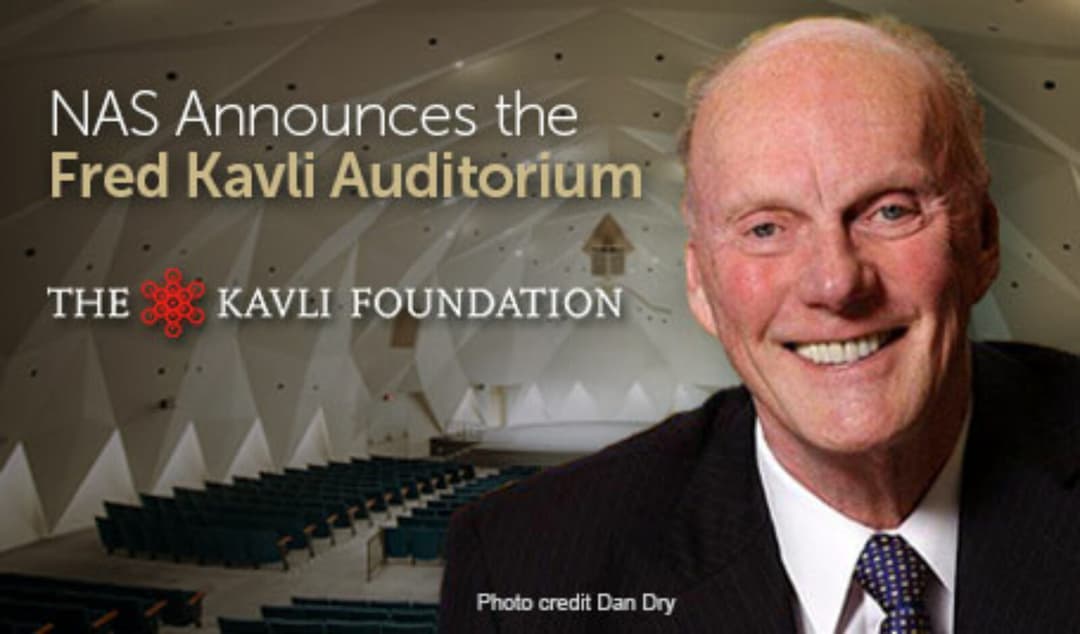The Kavli Foundation Gives $10.5 Million to the National Academy of Sciences to Establish Fred Kavli Endowment Fund; NAS Auditorium to Be Renamed in Kavli’s Honor

(Originally released by the National Academy of Sciences)
April 17, 2017
WASHINGTON – The National Academy of Sciences announced today that it has received a $10.5 million gift from The Kavli Foundation to establish the Fred Kavli Endowment Fund, which honors the late physicist, entrepreneur, innovator, business leader, and philanthropist. To recognize Kavli’s generous and unwavering support for science, the auditorium of the historic National Academy of Sciences Building will be renamed the Fred Kavli Auditorium. A portrait of Fred Kavli and a commemorative plaque will be unveiled at the NAS annual meeting, which will take place April 29 - May 2.
“Fred Kavli had an insatiable curiosity about the world around him that underscored his appreciation and support of science and basic research,” said Rockell Hankin, Chairman of The Kavli Foundation and Kavli’s friend and associate for 40 years. “This gift aligns strongly with our Foundation’s mission because it will give the National Academy of Sciences broad discretion in recognizing and promoting outstanding science for the betterment of the nation and the world.”
“The National Academy of Sciences is the symbolic home for science in the United States,” said Robert W. Conn, President and Chief Executive Officer of The Kavli Foundation. “It’s entirely fitting that Fred Kavli’s lasting contributions to the advancement of science are honored in a way that will have meaningful impact for the Academy and the entire scientific enterprise.”
“Fred Kavli was a champion of basic research and the scientific process, and his legacy is felt widely throughout society,” said National Academy of Sciences President Marcia McNutt. “Through this generous gift, the NAS will build on that legacy by providing leadership on emerging issues for which science can inform effective policy and promote understanding of science.”
The Fred Kavli Endowment Fund will provide unrestricted funding to the NAS. These funds will allow the NAS greater flexibility in providing timely guidance on cutting-edge issues in science through new programs and policy studies. The funding will also help support the Academy’s missions of validating scientific excellence; enhancing the vitality of the scientific enterprise; guiding public policy with science; and communicating the nature, values, and judgments of science to government and the public, including through symposia, workshops, and other events that bring together experts and practitioners from a wide variety of institutions and disciplines.
A Norwegian-born American citizen, Fred Kavli received a degree in engineering from the Norwegian Institute of Technology in 1955. He emigrated to the United States a year later, and in 1958 founded the Kavlico Corporation, which became one of the world’s largest suppliers of sensors for aeronautics, automotive, and industrial applications.
Kavli was the sole owner and sold the company in 2000. That same year, he established The Kavli Foundation, dedicated to advancing science for the benefit of humanity, promoting public understanding of scientific research, and supporting scientists and their work. The late NAS President Ralph Cicerone was among those from whom Fred Kavli sought advice and guidance in creating the Foundation.
The Foundation's mission is implemented through an international program of research institutes, professorships, symposia and other initiatives in the fields of astrophysics, nanoscience, neuroscience and theoretical physics. Located on three continents, the institutes are home to some of the most renowned researchers in their fields. The Foundation also supports programs aimed at empowering the communication of science to the public, such as the international AAAS Kavli Science Journalism Awards. It is also a founding partner, along with the Norwegian Academy of Science and Letters and the Norwegian Ministry of Education and Research, of the Kavli Prizes -- three $1 million biennial prizes to recognize scientists for their seminal advances in astrophysics, nanoscience, and neuroscience.
Kavli, who died in 2013, had a strong appreciation for the role of fundamental science in understanding the world. Discussing his interest in astrophysics, nanoscience, and neuroscience, Kavli said, “The Kavli Institutes will pursue science at astronomical scales – the universe; at the most infinitesimal scales – atoms and molecules; and in the most complex of all things – the human brain.”
The deep connections between The Kavli Foundation and the NAS are built upon mutual goals of promoting science and recognizing scientific excellence. The NAS is among an international group of scientific societies that appoints representatives to committees that recommend winners of the biennial Kavli Prizes in Astrophysics, Nanoscience, and Neuroscience. In addition, the NAS Kavli Frontiers of Science program, funded in part by The Kavli Foundation since 2005, brings together outstanding young scientists from a variety of disciplines to discuss advances and opportunities and build long-term relationships. In 2007, Fred Kavli and The Kavli Foundation provided initial funding to support the Academy’s America’s Energy Future project. And the Foundation and the Academy have worked together to encourage the adoption of convergence research at universities across the country. This is research that integrates promising developments in the physical and life sciences, mathematics, and engineering in order to find solutions to some of the most complex challenges facing humanity.
The National Academy of Sciences is a private, nonprofit institution that, along with the National Academy of Engineering and the National Academy of Medicine, provides independent, objective analysis and advice to the nation to solve complex problems and inform public policy decisions related to science, technology, and medicine. The Academies operate under an 1863 congressional charter to the National Academy of Sciences, signed by President Lincoln. For more information, visit www.national-academies.org.
Contacts:
Molly Galvin, Senior Media Officer
Joshua Blatt, Media Relations Assistant
Office of News and Public Information
202-334-2138; e-mail [email protected]
https://www.nationalacademies.org/newsroom/
Twitter: @theNASEM and @theNASciences
RSS feed: https://www.nationalacademies.org/rss/index.html
Flickr: https://www.flickr.com/photos/nationalacademyofsciences/sets
